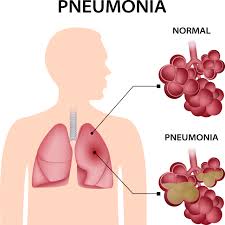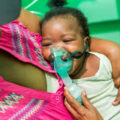Pneumonia is an infection in one or both lungs. Bacteria, viruses, and fungi cause it. The infection causes inflammation in the air sacs in your lungs, which are called alveoli. The alveoli fill with fluid or pus, making it difficult to breathe. In the United States, 1.3 million people were diagnosed with pneumonia in an emergency department in 2017. Unfortunately, about 50,000 people die from the disease each year in the United States. Most of the people affected by pneumonia in the United States are adults.
Most cases of pneumonia can be treated at home. However, babies, children, and people with severe pneumonia may need to be admitted to the hospital for treatment. Pneumonia is usually treated with antibiotics, even if viral pneumonia is suspected as there may be a degree of bacterial infection as well.
Is pneumonia contagious?
The germs that cause pneumonia are contagious. This means they can spread from person to person. Both viral and bacterial pneumonia can spread to others through inhalation of airborne droplets from a sneeze or cough. You can also get these types of pneumonia by coming into contact with surfaces or objects that are contaminated with pneumonia-causing bacteria or viruses. You can contract fungal pneumonia from the environment. However, it doesn’t spread from person to person.
Symptoms of pneumonia
Pneumonia symptoms can be mild to life-threatening. They can include:
- coughing that may produce phlegm (mucus)
- fever
- sweating or chills
- shortness of breath that happens while doing normal activities or even while resting
- chest pain that’s worse when you breathe or cough
- feelings of tiredness or fatigue
- loss of appetite
- nausea or vomiting
- headaches
Other symptoms can vary according to your age and general health.
Can Flagyl Treat Pneumonia?
Flagyl is used to treat parasitic infections including Giardia infections of the small intestine, amebic liver abscess, amebic dysentery (infection of the colon causing bloody diarrhea), bacterial vaginosis, trichomonas vaginal infections, and carriers of trichomonas (both sexual partners) who do not have symptoms. According to the World Health Organization, Pneumonia should be treated with antibiotics. The antibiotic of choice is amoxicillin dispersible tablets. Most cases of pneumonia require oral antibiotics, which are often prescribed at a health center. These cases can also be diagnosed and treated with inexpensive oral antibiotics at the community level by trained community health workers. Hospitalization is recommended only for severe cases of pneumonia.
How To Help Prevent Pneumonia
Get vaccinated. Vaccines are available to prevent some types of pneumonia and the flu. Talk with your doctor about getting these shots. The vaccination guidelines have changed over time so make sure to review your vaccination status with your doctor even if you recall previously receiving a pneumonia vaccine.
Make sure children get vaccinated. Doctors recommend a different pneumonia vaccine for children younger than age 2 and for children ages 2 to 5 years who are at particular risk of pneumococcal disease. Children who attend a group child care center should also get the vaccine. Doctors also recommend flu shots for children older than 6 months.
Practice good hygiene. To protect yourself against respiratory infections that sometimes lead to pneumonia, wash your hands regularly or use an alcohol-based hand sanitizer.
Don’t smoke. Smoking damages your lungs’ natural defenses against respiratory infections.
Keep your immune system strong. Get enough sleep, exercise regularly, and eat a healthy diet.
READ: Can Flagyl Prevent Pregnancy?






